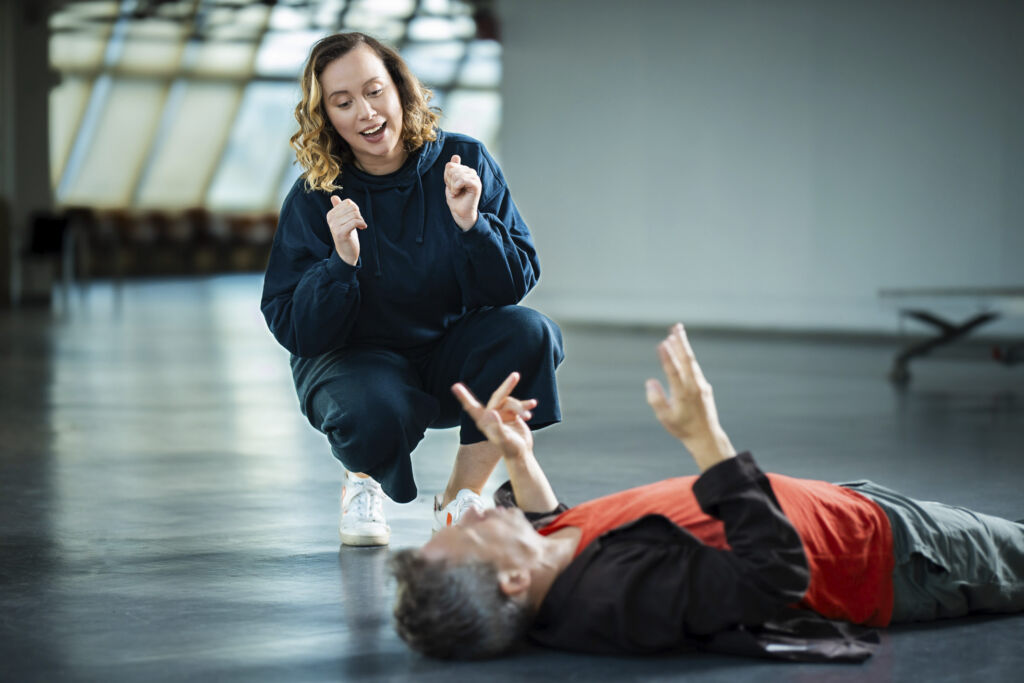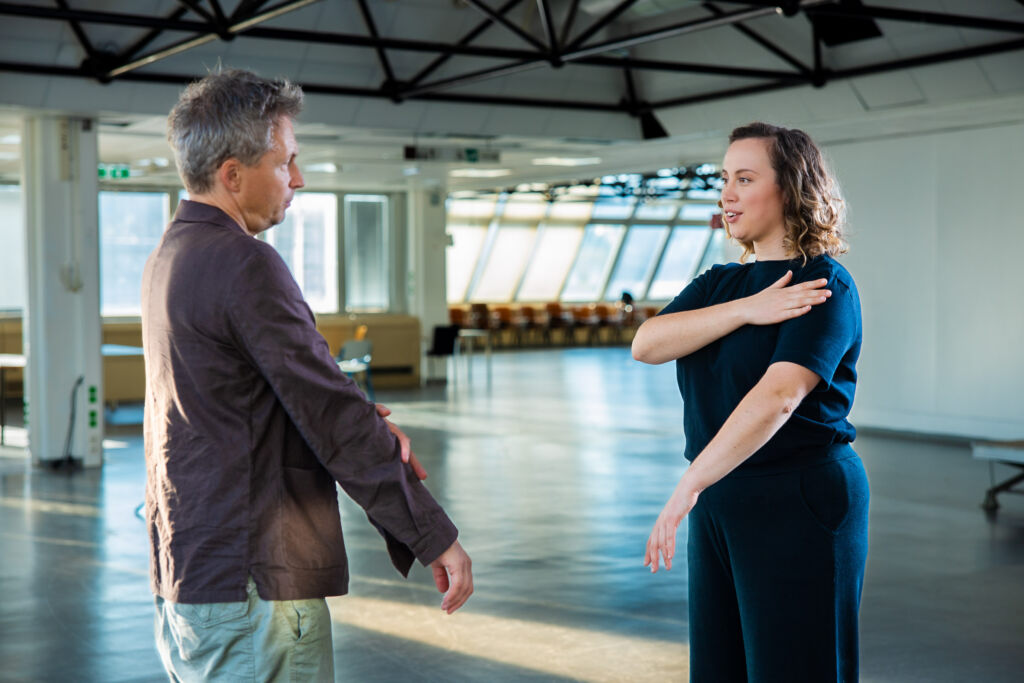Actor Katharina Haudum also works as an intimacy coordinator— in which capacity she has been teaching the course Intimacy Coordination and Consent-Based Practice at the Max Reinhardt Seminar since the summer semester of 2024. She recently provided mdw Magazine with intriguing insights into her work.
As an intimacy coordinator, Katharina Haudum choreographs intimate film scenes in collaboration with directors and actors. Her job is a relatively new one, with awareness of this position’s importance on set growing slowly but surely. “Actors are allowed to have boundaries—but until just a few years ago, this attitude wasn’t all that widespread,” remarks Haudum. In her teaching, she works together with the Max Reinhardt Seminar’s acting and directing students to thematise personal boundaries, consensuality, power dynamics, and hierarchies in film and theatre. “Knowing their own boundaries enables actors who do such scenes together to feel secure, which improves their acting,” says Haudum. How do actors figure out where their boundaries lie? “Students learn things like how a physical boundary check is done. Pointing things out using my own body and guiding the hands of my opposite helps to communicate personal boundaries without any pressure.” Dealing with boundaries prior to a shoot or performance should be normalised, she says—to which end an awareness of this theme needs to be cultivated in students. It’s important to Haudum that directing students also take her course: “Directors are usually positioned above actors in the hierarchy, so it’s important to sensitise them, as well, to how it’s necessary to have a specially trained external person for the choreography of intimate scenes.”

In theatre, intimacy coordination is requested less often than in film. Haudum attributes this fact to revelations concerning abuses of power and sexual assault in the US film industry and the resulting “MeToo” debate, in which victims spoke out about their experiences of sexualised violence. The media reporting that ensued caused more of a stir in the film industry than it did in the theatrical world. But at theatres, says Haudum, involving intimacy coordinators would be just as necessary.
An important point in intimacy coordination is ensuring consensual interactions. The basis for doing so is provided by specific information prior to a shoot. Haudum mentions the following example: “A screenplay calls for ‘passionate sex’. What does this entail for the actors? How much naked skin should be visible, and what simulated sexual acts are being called for?” Only when actors know precisely what is required can they grow comfortable with a given scene. And for the production phase as a whole, this saves time that might otherwise be lost due to spontaneous refusal by actors to shoot such scenes.

While choreographing intimacy is often compared to stunt and fight choreography, hiring stunt coordinators goes without saying to a far greater extent. “Stunts have a potential to result in bodily injury; therefore, experts get hired. Filming intimate scenes likewise brings with it a potential for injury, but such injuries are invisible—they occur on the psychological level,” says Haudum. Here, the language that gets used is important: “As an intimacy coordinator, I give de-sexualised choreographic instructions that shift what’s being played away from the actors’ private sexuality.” A further important responsibility of intimacy coordinators is documenting what was agreed upon with the artists in terms of honouring their boundaries. The lion’s share of intimacy coordination is done prior to filming. “Ideally, I’m already involved during the screenwriting and casting processes. There needs to be time to prepare,” says Haudum. Critics of intimacy coordination view it as a violation of artistic freedom or even as censorship of intimate scenes. Haudum’s response: “Intimacy coordination doesn’t diminish sex scenes; on the contrary, it makes them better. And actors even tend to be willing to do and show more if they know the why and wherefore.”
Following graduation from her acting studies at the Max Reinhardt Seminar, Haudum completed an additional course of training in psychosocial counselling—which provided an important foundation for her subsequent training as an intimacy coordinator with pioneers from the USA, Canada, and Great Britain. Her acting experience, which is focused on film, is of immense help in this work: “For me, repeatedly experiencing this change of perspectives is essential.” As an intimacy coordinator, she has accompanied numerous projects including the miniseries Kafka (director: David Schalko) and the cinematic film What a Feeling (director: Kat Rohrer).

Haudum is now passing on her knowledge to students, as part of which she likewise learns a lot: “The exchange with students enables me to constantly examine what I’m conveying thanks to the direct feedback they give me.” In her teaching, she seeks to make students aware of what’s possible: “Actors can suggest that intimacy coordinators be hired and even have that written into their contracts. Developing a sex scene with impactful choreographic techniques without having to do anything for real makes possible a new degree of freedom in acting.” What’s more, she tells students about what kinds of physical barriers exist. “Garment barriers look like bathing suit material with inserted silicone. These prevent genital contact.” Such barriers are available for the breasts, as well.
In her own acting studies, dealing with intimate scenes wasn’t much of a topic—for which reason she viewed it as that much more necessary that the course Intimacy Coordination and Consent-Based Practice, which is unique in the context of German-language acting programmes, be offered. In film and in theatre, she’d like to see the hiring of intimacy coordinators become standard practice. After all, “True engagement with this topic and teams’ willingness to deal with it leads to fantastic and meaningful intimate scenes created within the boundaries of those involved”—and impactfully realised scenes captivate those who view them all the more.

